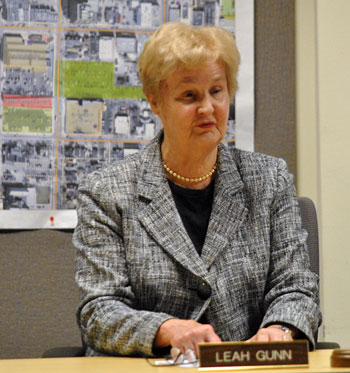DDA Ramps Up PR After First Council Vote
Ann Arbor Downtown Development Authority board meeting (April 3, 2013): The board had no voting business on its agenda, but still dealt with serious business: the city council’s initial approval of changes to the DDA ordinance. The changes are meant to clarify the authority’s tax increment finance (TIF) capture, as well as place restrictions on board composition. [.pdf of Chapter 7 amendments]
The proposed amendments to Chapter 7 of the city code, given initial approval at the council’s April 1, 2013 meeting, would reduce the DDA’s TIF capture by roughly $931,000 for FY 2014 – compared to the amount the DDA would receive based on the DDA’s current interpretation of the ordinance. But in adopting its two-year budget recently, DDA did not factor in recent building projects in the downtown – which add to the increment on which the DDA can capture taxes, starting in FY 2014.
So compared to the amount of TIF revenue in the DDA’s adopted FY 2014 budget, the clarified calculations would result in only about $363,000 less TIF revenue for the DDA. And compared to the DDA’s adopted FY 2015 budget, the clarified calculations would result in about $74,000 less revenue than budgeted. The clarified calculations would result in TIF revenue to the DDA in FY 2014 and FY 2015 of $3.570 and $3.682 million, respectively.
A dispute on the clarity of the existing Chapter 7 language had emerged in May 2011 just as the DDA and the city were poised to sign a newly renegotiated agreement under which the DDA manages the public parking system. At that time, the city’s financial staff reportedly first noticed the implications of an existing Chapter 7 paragraph that appears to place a cap on the DDA’s TIF capture – a cap that’s calibrated to projections in the DDA’s TIF plan. The TIF cap rises each year based on forecast growth in the DDA’s TIF capture district.
Several board members weighed in on the issue during the April 3 meeting. The idea of any kind of cap – let alone one that’s based on estimates contained in the appendix of the DDA’s TIF plan – was sharply criticized by Joan Lowenstein, who characterized the approach as based on “a fallacy.” She also called the idea of a cap poor public policy. However, both the cap and its basis are already in the existing ordinance language that the city council’s ordinance amendment seeks to clarify.
Roger Hewitt took the board’s meeting as an opportunity to question whether the ordinance amendments actually clarify how the calculations are to be done, contending that he’d come up with different results than the city treasurer, starting from the same ordinance language. He cautioned that the DDA’s financial planning and the DDA’s budget would need to be re-evaluated – allowing for no “sacred cows” – if the council gave final approval to the ordinance changes.
Russ Collins contrasted the amount of net revenue received by the city from the geographic area of the DDA district before the DDA was established back in 1982, compared to today. The net proceeds from taxes and the public parking system (which lost about $250,000 a year during that era) came to about $1.25 million 30 years ago, according to Collins. Today, the city receives nearly $8 million annually – around $4 million in taxes, $3 million in parking revenue, and a grant to the city of roughly $0.5 million a year toward debt on the city’s new Justice Center building.
Bob Guenzel focused his remarks less on the financial side and more on the aspects of the ordinance change that would restrict future board membership. He saw no benefit to the proposed DDA term limits, noting that the city council has an opportunity to end a DDA board member’s service by deciding not to re-appoint someone to the board. John Mouat was critical of the proposed ordinance changes that would prevent elected officials of taxing jurisdictions from serving on the board, saying he’d found the participation of politically-connected people to be beneficial to the board.
The extended remarks by board members on the topic came in the context of a 7-3 vote by the city council on April 1, giving initial approval of the ordinance changes. [Christopher Taylor (Ward 3) was absent from the meeting of the 11-member council.] A second vote, expected at the council’s April 15 meeting, would be required to enact the changes. Based on their remarks made at the council table, two of the seven votes in support of the changes – by Marcia Higgins (Ward 4) and Sabra Briere (Ward 1) – were widely read as likely to change at the second vote. Ordinance changes require a six-vote majority.
In addition to discussion of the possible ordinance changes, the DDA heard its usual range of committee reports, including the monthly parking update. Public commentary related to a possible artificial ice-skating rink atop the Library Lane underground parking garage. [Full Story]




